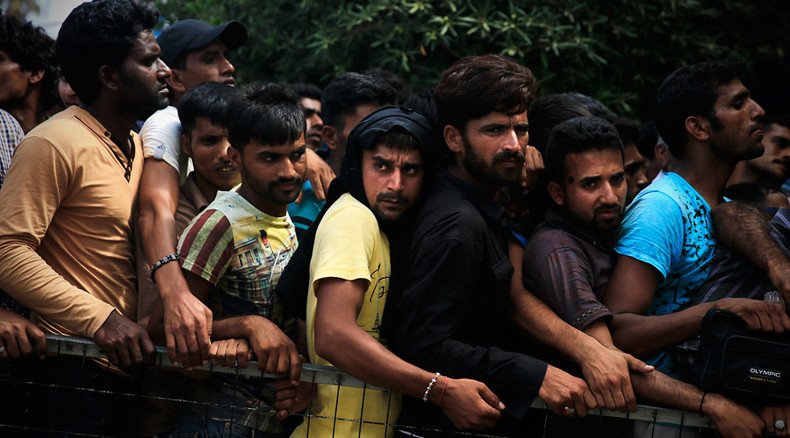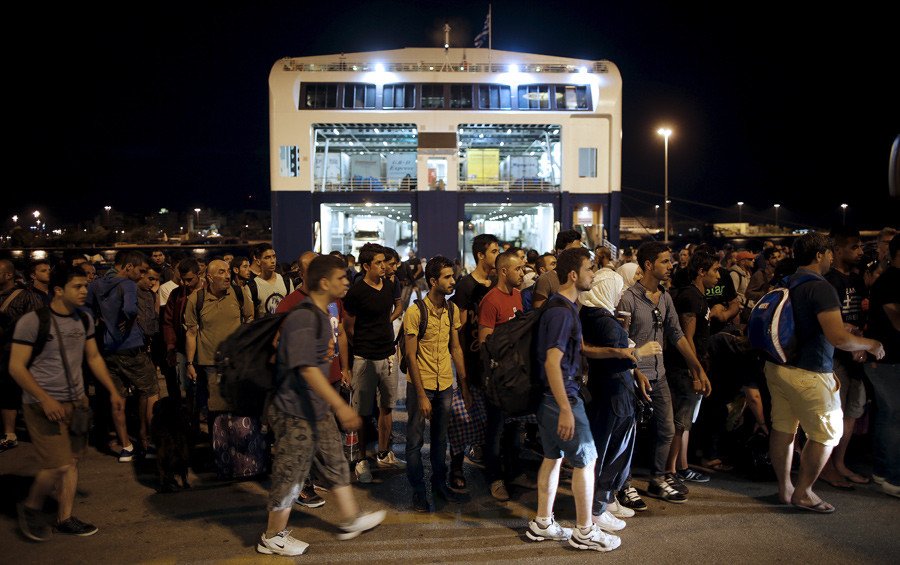Refugees come to EU because they have no other choice – UN

Measures like fences won’t improve the EU refugee crisis, says UNHCR spokesperson Melissa Fleming. It is people’s right to seek asylum if they flee from war and be allowed to stay until peace comes to their home country.
RT: You say there'll be no end to the flow of people in the coming months. Why is the situation so dire? What is the root of the problem?
Melissa Fleming: It is very much a reflection of the violence and conflicts in the world today. The vast majority of people who are fleeing into Europe now are coming from Syria, from Iraq, from Afghanistan and from Eritrea. If you look just at the Syria situation – there is just no end in sight to the violence, people are continuing to leave and many people are not going and seeking refuge in the neighboring countries anymore because there are four million people in conditions that are really dire.
RT:What are the root causes of the problem?
MF: The root cause is obviously – people who can’t stay in their own homes because it’s too violent. They are basically fleeing for their lives. If you look at the numbers and the population breakdown of people coming to Europe, most of them are refugees. Of course there are some people who are coming - significant numbers too - who are fleeing for economic reasons, or coming to Europe for economic reasons. But because the majority are fleeing conflict, we are saying that is a refugee crisis, and refugees have a right to seek asylum, and we’re asking the countries of Europe to come together and to receive this people humanly and with dignity.
RT: What is the main reason of people fleeing from their home countries?
MF: If you look at the situation in Syria or on situation in Iraq, basically you just have to read the news: there is ongoing fighting, the number of groups fighting each other – has meant the conflict continuously shifts. So maybe somebody living in one town that was relatively stable the next day the conflict moves into that town and they have no choice but to leave. So you have different parties fighting - lots of violence, lots of bombing. It’s terrifying for many people there; they’ve lost their homes, they’ve lost their occupations, their children are no longer in school. They really feel like they have no choice, but to flee, and go to a country that will offer them refuge, safety and a chance to rebuild their lives.
RT: You also said Europe could cope with the migrant crisis if the right measures were taken. What measures did you have in mind?
MF: First of all, just compared to the neighboring countries of Syria, they have taken in four million refugees. Turkey alone has taken in two million refugees. So the numbers that have come to Europe this year – which is just over 300,000 - for a continent that big - it actually isn’t that many people. So we do believe that Europe has the capability, it has the wealth, and it has the wherewithal to take care of these people. The issue is, and what has been exposed is, that there are some counties much more sophisticated than others and able to deal with the refugee flow. The border countries like Greece and Italy are having to receive thousands and thousands of people every single day, and now the Balkan countries. Their infrastructures are very week. They are dealing with their own financial issues. So we’re saying that the EU needs to show that it is one European Union and show solidarity, help out the countries that are receiving the most and distribute equally among countries the burden.

RT: Is the bloc not dealing with the crisis in the right way? Why?
MF: One of the things that was exposed is that the European, the common asylum system is dysfunctional. There is not one system that is functioning the same way in every country. And that is the problem. That is why you see the majority of refugees going to countries like Germany or like Sweden, like Austria where they have very strong asylum systems, they have the means to handle large groups of people to not only process their asylum claims, but then to integrate them, providing schooling, training, work possibilities, the ability for their children to go to school. But we say this is wrong that Germany and Sweden have to take 43 per cent of all the asylum seekers in Europe. It should be more evenly distributed and the countries that have fewer means should be helped.
RT: We've seen separate countries taking measures on their own to protect their borders like building fences and deploying troops. Will this help? Why is there a lack of cohesive actions coming from Brussels?
MF: We obviously believe every country has a right to protect their own borders, but we don’t think building fences to keep people out of their countries is going to help the situation. This will just mean that people who, and again I have to repeat - the majority of the people coming are refugees, people who’ve gone through terrible trauma - this is just going to make their trauma even worse, and their attempts to go underground and to use other means to reach Europe through other borders. So it is not a solution to the problem, and that is why we believe we need to allow people to enter. It is the right for people to seek asylum, to have their case heard, and if they are fleeing from war or prosecution to be allowed to stay until which time their country is at peace. Many people don’t want to come. They are not coming by choice; they are coming because they have no other choice. More than anything they would like to go back home, but they just can’t.
Tony Robinson, Co-director of the Pressenza international press agency, agrees that building fences is not a solution for the ongoing migrant crisis.
“These fences are very concerning. We are talking here about in Hungary a 150 kilometer border being fenced, but there are thousands of kilometers of borders that the EU would have to fence from the Baltic Sea down to the Mediterranean and the Black Sea. This is clearly unfeasible,” he said. “Germany this week talked or proposed that maybe the Schengen agreement could be suspended and this would be very worrying because if you remove freedom of movement within Europe’s borders then you remove one of the pillars on which the EU is based. I think many countries subject to an economic system which is really not doing them any favors would really start to question why on earth they continue to remain in the EU… Building fences is not a solution to the migrant crisis,” Robinson told RT.
Dan Glazebrook, independent political analyst says that even though fences do not help to keep the migrants out, “that’s the only solution that seems that the EU can think of.”
“Not just walls, but also sinking the boats that the migrants are travelling in. This was the policy the EU unveiled in April this year,” he told RT.
“You have to be very desperate to board one of these flimsy rafts across the Mediterranean and put yourself on a truck with no ventilation, and so on. They are fleeing wars in Libya, Syria, in Somalia. These are desperate people. Sometimes people have this idea that they are economic migrants. Frankly if they were economic migrants, they would be perfectly justified in following their own plundered wealth from their countries to Europe - the continent that plundered it. But they are not. The truth is- they are fleeing war. The only response that the EU can think of is to try to block them coming in - build walls,” Glazebrook said.
The statements, views and opinions expressed in this column are solely those of the author and do not necessarily represent those of RT.
LISTEN MORE:
The statements, views and opinions expressed in this column are solely those of the author and do not necessarily represent those of RT.












